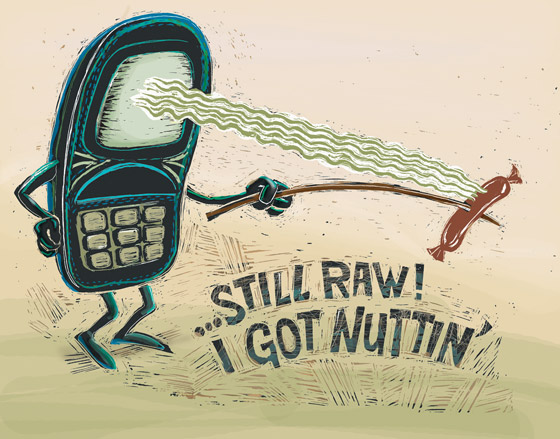by
Steven Novella, Apr 30 2012
There is an ongoing scientific discussion about the safety of long term cell phone use. The primary question is whether or not long term exposure to non-ionizing radiation can increase the risk of brain cancer. There are further questions about whether or not such radiation can cause any health problems or symptoms.
As with any complex area of scientific research, perhaps the best way to evaluate the question is to put together a panel of experts to review all the existing evidence and then come up with a consensus opinion about that evidence. This is no guarantee of being right – the primary issue that tends to come up with such expert panels is that they were systematically biased toward one side of the debate. But assuming no major asymmetry in the constitution of an expert panel, they are an excellent way to evaluate the current state of the evidence on a specific question. Even better, of course, is when multiple independent panels all agree.
Recently an expert panel for the UK’s Health Protection Agency (HPA) reviewed the evidence for cell phone safety concluded that there is no clear evidence for any harm. This is good news. Their findings are similar to other reviews of the evidence, although often there is a difference in emphasis. For example, last year the International Agency for Research on Cancer (IARC) reviewed the same evidence and concluded that:
“the evidence, while still accumulating, is strong enough to support a conclusion and the 2B classification. The conclusion means that there could be some risk, and therefore we need to keep a close watch for a link between cell phones and cancer risk.”
Continue reading…
comments (48)
by
Brian Dunning, Mar 22 2012
by
Steven Novella, May 16 2011
In the last week I have received a flood of e-mails asking my opinion about an article, “Scientists cure cancer, but no one takes notice.” The sensational theme is a familiar one – scientists hit upon a cure for cancer, but since the drug in question is already off patent (or is “natural”) the pharmaceutical industry is not interested in developing it. The more conspiracy-minded take it a step further and declare that “Big Pharma” will keep anyone else from developing it either.
Most of those e-mailing me saw the skeptical red flags in this story, but still many found the idea intriguing. Like most urban legends – something about the story resonates with our hopes and/or fears. The story rides this emotional wave, now supercharged by social media.
In fact, this is an old story about DCA (which I will get into below). The article that has been going around is four years old – there is no date on the article itself, but I recognize the story from several years ago (it has made the rounds numerous times) and there are four-year-old comments on the article. But, someone posted the article on their Facebook page, and someone else tweeted it, and it was retweeted and linked to by other Facebook pages and voila – the magic of the internet has breathed life into a dessicated urban legend.
Continue reading…
comments (32)
by
Michael Shermer, Dec 07 2010

Ever since the publication of physicist Dr. Bernard Leikind’s article in Skeptic (see eSkeptic for June 9, 2010) and my subsequent column in Scientific American in which I cited Leikind’s arguments (both of which were skeptical of claims that cell phone use causes brain cancer), we have been inundated with letters disputing our skepticism. The letters come in a variety of flavors, so what follows are Dr. Leikind’s responses to the critics that he identifies by their email names. My own response to critics will appear in the next issue of Scientific American, so in the meantime I defer to Dr. Leikind’s responses below, as well as to the SkepDoc Harriet Hall, M.D. along with oncologist Dr. David Gorski, both of whom blog at ScienceBasedMedicine.org, which covers the ongoing controversy over cell phones and cancer. Continue reading…
comments (62)
by
Brian Dunning, Oct 21 2010
 Just in case you thought the amount of woo in the world was diminishing, here comes an author to restore your faith. Randall Dale Chipkar has written a self-published new book that explains how your motorcycle is giving you cancer, The Motorcycle Cancer Book (http://www.motorcyclecancer.com).
Just in case you thought the amount of woo in the world was diminishing, here comes an author to restore your faith. Randall Dale Chipkar has written a self-published new book that explains how your motorcycle is giving you cancer, The Motorcycle Cancer Book (http://www.motorcyclecancer.com).
As you know, a motorcycle's engine incorporates a magneto that generates electricity to power the spark plugs, fuel pump, and other systems needed to run the bike. There is nothing about this unique to motorcycles; the same basic system is used in virtually all internal combustion engines, like those found in cars, boats, lawnmowers, radio controlled airplanes, even the jets found in airliners and cruise missiles. So why the beef about motorcycles? Why, because that engine is right near your groin! Continue reading…
comments (35)
by
Steven Novella, Sep 27 2010
Yes, I know – this is old news. That the Huffington Post is a cesspit of anti-scientific propaganda. This recent item, however, is bad even for Huff Po standards. If I were writing a textbook on propaganda and wanted to craft an extreme example in order to clearly demonstrate the features of propaganda, I could not have done a better job than Nalini Chilkov. She is promoting the book of Hollie and Patrick Quinn, You Did What? Saying No to Conventional Cancer Treatment.
Chilkov tells her readers how Hollie was diagnosed with breast cancer while pregnant at age 27. After telling us over and over again how intelligent, educated, and well-informed Hollie and her husband are, we are informed that Hollie decided to treat her breast cancer entirely with alternative cancer treatments. And now, 8 years later, she is perfectly healthy and has two wonderful children.
First, let me say that I am very happy for Hollie and Patrick and I sincerely wish that Hollie has nothing but the best of health. This story is actually somewhat personal for me as my wife was diagnosed with breast cancer earlier this year, and now she is doing very well after standard treatment. So I understand, not just as a physician but as a husband, how difficult it is to face this diagnosis and the treatment options.
Continue reading…
comments (41)



